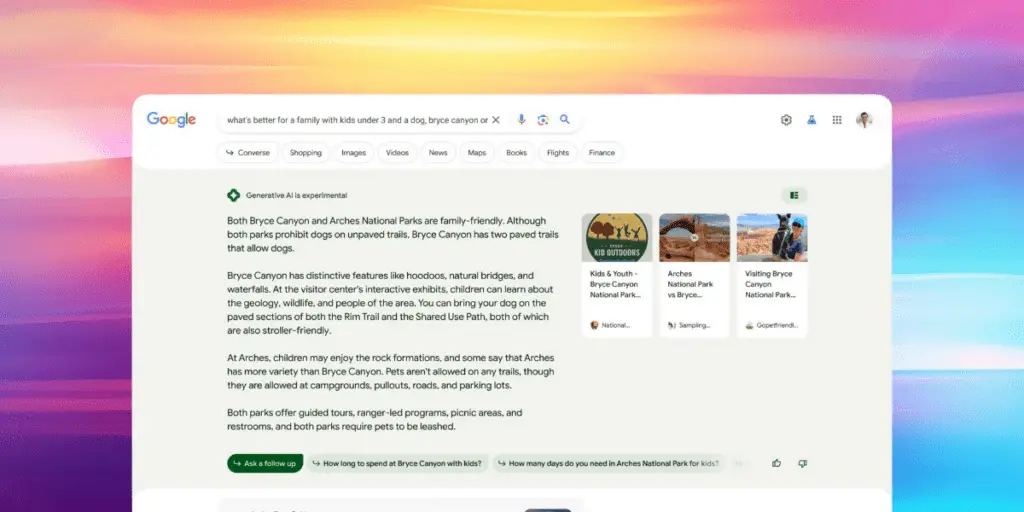Google reportedly plans to transition its Search Generative Experience, a cutting-edge, generative AI-powered search tool, to a paid-tier offering.
This news, initially reported by the Financial Times, signals a bold step for the tech giant in monetizing advanced AI capabilities within its search functionalities.
The SGE, which Google introduced as an experimental feature, aims to revolutionize how users interact with search results by delivering more direct, AI-generated information summaries rather than the traditional list of website links.
This move to make SGE exclusive to paid subscribers marks a potential shift in the digital landscape. It reflects both the growing costs associated with advanced AI technologies and users’ evolving expectations in the age of generative AI.
Background
The Search Generative Experience represents Google’s ambitious foray into integrating generative artificial intelligence with its search services. It aims to enhance the user’s search experience by providing more concise and relevant information upfront.
Launched in August of the previous year, SGE has been accessible to users on an opt-in basis through Google’s Search Lab, allowing them to experience a new dimension of search that goes beyond the traditional list of links to websites.
This AI-powered tool generates an overview of crucial information related to a user’s query, accompanied by relevant links that direct to the source material.
This approach streamlines the search process and significantly changes how information is presented and consumed on the web.
Unlike standard search results, which require users to navigate multiple websites to find the information they seek, SGE presents a synthesized summary directly on the search page, making the search process more efficient and user-friendly.
The introduction of SGE reflects Google’s ongoing commitment to harnessing the power of AI to improve and innovate upon its core services.
By embedding generative AI into its search engine, Google aims to meet the evolving needs of users who demand faster and more accurate access to information in an increasingly information-saturated digital environment.
This technological advancement comes at a cost, necessitating substantial computing resources to generate AI-powered search results, prompting Google to consider making SGE a premium feature within its subscription-based services.

Google’s Statement and Plans
In response to the report by the Financial Times regarding the potential monetization of the Search Generative Experience, Google articulated its position and future intentions.
The company highlighted the significant traction and positive user engagement SGE has garnered since its inception, stating, “With our generative AI experiments in Search, we’ve already served billions of queries, and we’re seeing positive Search query growth in all of our major markets.
We’re rapidly improving the product to serve new user needs.” This statement underscores Google’s satisfaction with the performance and reception of SGE among users across various regions.
Google clarified its ongoing commitment to keeping the traditional search service free for users, ensuring that the core search functionalities remain accessible to everyone.
Including SGE in the company’s premium subscription services is presented as an enhancement rather than a restriction. It offers advanced AI-powered tools alongside existing features such as Gemini Advanced and AI-enhanced functionalities in Gmail and Docs.
Google’s approach reflects a strategic move to bundle SGE with other value-added services, enriching its premium offerings.
Despite these advancements, Google reassured users and advertisers that it has no plans to remove ads from the search results.
The statement, “We are not working on or considering making the Search ad-free,” reiterates the company’s business model, which relies significantly on advertising revenue.
Google also hinted at its ambitious roadmap, mentioning that it would “continue to build new premium capabilities and services to enhance our subscription offerings across Google.”
This suggests an ongoing effort to develop and integrate more advanced features and services, catering to the evolving needs of its user base while navigating the financial implications of deploying high-resource-consuming AI technologies.
Implications for Users and Publishers
The potential shift of Google’s Search Generative Experience to a paid subscription model carries significant implications for users and content publishers.
This move reflects a broader trend in the digital economy towards monetizing advanced technological features, particularly those powered by AI, which require substantial computational resources to function.
For users, SGE’s transition to a premium service could shift how they access and utilize search functionalities.
On the one hand, subscribers to Google’s premium service would gain exclusive access to enhanced search capabilities, which would offer a more efficient, streamlined, and enriched search experience.
This could include receiving concise summaries of search queries, which would reduce the time and effort needed to sift through multiple web pages to find relevant information.
On the other hand, this move could also introduce a new cost barrier for accessing advanced search features previously available for free during the experimental phase.
Users unwilling or unable to pay for the premium subscription might find themselves relegated to the traditional search model, potentially missing out on the benefits of AI-enhanced search capabilities.
This delineation could lead to a bifurcation of the search experience, with premium users enjoying a more advanced and efficient service than free users.
Content publishers and online platforms, many of whom rely heavily on Google search traffic to drive visitors to their sites, face different considerations.
Implementing SGE in its current form presents a challenge, as it provides users with summaries and key information directly in the search results, potentially reducing the need for users to click through to the original content sources.
This could lead to a decline in traffic for many websites, impacting their advertising revenue and visibility.
Making SGE a paid feature could mitigate some of these concerns by limiting the number of users who have access to these AI-powered summaries. This would maintain the flow of traffic to publisher sites from the larger pool of users who continue to rely on traditional search results.
The model could encourage Google to develop new ways of integrating and highlighting content from publishers within the SGE framework, offering publishers new avenues to reach engaged audiences.

Financial and Strategic Considerations
Google’s decision to potentially transition its Search Generative Experience (SGE) to a paid service is underpinned by both financial and strategic considerations, reflecting the broader challenges and opportunities inherent in the deployment of advanced AI technologies.
One of the primary motivators for this shift is the substantial cost of running generative AI systems. These technologies require significant computational power and resources, increasing operational expenses.
As Google aims to provide an AI-powered search experience that is both innovative and responsive to complex queries, the expenses tied to these computational demands have grown. Making SGE a paid feature could help offset these costs, ensuring the sustainability of offering such advanced capabilities.
This move aligns with the trend of monetizing digital products and services, providing Google with a new revenue stream to support ongoing research, development, and enhancement of its AI technologies.
Strategically, incorporating SGE into Google’s premium subscription services could serve multiple objectives.
- Firstly, it enhances the value proposition of Google’s paid offerings, making them more attractive to users seeking cutting-edge tools and functionalities. This could help Google retain its current subscriber base and attract new users willing to pay for advanced search capabilities.
- Secondly, this strategy allows Google to navigate the delicate balance between innovation and its impact on content publishers. By limiting the most resource-intensive AI-powered features to paying customers, Google might mitigate some of the concerns from publishers about losing traffic and revenue due to direct answers in search results. This approach could preserve the ecosystem’s health, ensuring that publishers who rely on Google for traffic continue to thrive.
- Thirdly, offering SGE as a premium service might give Google valuable insights into user willingness to pay for advanced AI-powered services, informing future product development and pricing strategies. It could also set a precedent for how advanced AI features are packaged and monetized in the tech industry, potentially influencing broader market trends.
Google’s potential move to make SGE a paid feature underscores a strategic effort to balance the need for continuous innovation in search technology with the financial realities of supporting such advancements.
By carefully navigating this transition, Google aims to maintain its leadership position in the search engine market, satisfy user demands for more sophisticated search tools, and address the financial implications of deploying high-resource-consuming AI technologies.
This approach reflects a broader trend in the digital economy towards recognizing the value of advanced AI capabilities and the necessity of developing sustainable models for their delivery and maintenance.
As AI continues to transform the digital landscape, companies like Google are at the forefront of exploring how best to integrate these technologies into their services to benefit users, support content creators, and align with their strategic business objectives.
Future of Google Search
The potential inclusion of the Search Generative Experience within Google’s premium subscription services marks a pivotal moment in the evolution of search technologies. It underscores broader trends in integrating artificial intelligence into everyday digital tools.
This move provides insights into the future of Google Search and the direction of digital search technologies.
The future of Google Search will likely see even deeper integration of AI technologies, extending beyond SGE.
As machine learning models become more sophisticated, we expect Google to introduce more personalized, context-aware search experiences that anticipate user needs, offer proactive suggestions, and provide even more accurate, nuanced responses to queries.
This could also mean a shift towards more conversational, natural language interactions with search engines, making the search experience more intuitive and engaging for users.
Google’s exploration of premium, AI-powered features signifies diversifying its monetization strategies. While advertising will remain a significant revenue stream, the company will likely explore additional models to capitalize on its advanced technological offerings.
This includes premium subscriptions, tiered access to features, and microtransactions for specific high-value functionalities.
Such strategies would not only help cover the costs associated with developing and maintaining advanced AI technologies but also allow for more flexibility in offering tailored services to different user segments.
As Google and other tech giants integrate AI into their products, ethical considerations and user trust will become increasingly central. Issues around data privacy, algorithmic transparency, and AI’s impact on information dissemination will require careful navigation.
Google will need to continue investing in ethical AI research and transparent communication with users about how their data is used and how AI influences the search results they see. Building and maintaining trust will be crucial as the company introduces more AI-driven innovations.
The evolution of Google Search will also likely be shaped by collaboration and competition within the tech industry. Partnerships with AI research institutions, tech startups, and content creators will be vital in driving innovation and ensuring the relevancy of search results.
At the same time, competition from other search engines and tech companies, some of which may offer their AI-powered features or unique value propositions, will push Google to improve and differentiate its offerings continuously.
The future of Google Search will be influenced by its global user base and the need for accessibility.
This includes not only the linguistic and cultural adaptability of search services but also ensuring that advanced features are accessible to users with different abilities and in varied socio-economic contexts.
As AI technologies advance, their potential to democratize access to information, facilitate learning, and connect communities will be essential in their development and deployment.

Final Thoughts
Google’s potential move to make its Search Generative Experience a paid feature signifies a watershed moment in the evolution of digital search technologies.
This strategy, driven by the need to manage the substantial resources required for advanced AI capabilities, reflects a broader technological landscape shift towards monetizing premium services.
This transition offers users a glimpse into a future where access to cutting-edge AI-powered tools may be expensive, yet it promises an enhanced, more efficient search experience.
For content publishers, it presents challenges and opportunities as they navigate the changing dynamics of web traffic and visibility in an AI-integrated digital ecosystem.
The implications of this shift extend beyond the immediate financial and strategic considerations for Google. They touch on broader themes of accessibility, privacy, and the ethical use of AI in shaping the information landscape.
As Google continues to pioneer the integration of AI into its core services, the company’s approach to balancing innovation with user trust, data ethics, and the equitable distribution of technology will be closely watched.
Looking forward, Google Search’s evolution points towards a more AI-driven, personalized, and potentially segmented internet experience.
The manner in which Google manages this transition—balancing its commercial interests with its foundational role in democratizing access to information—will have lasting implications not just for users and publishers but also for the wider digital economy.
As we stand on the brink of this new era, Google Search’s journey from a freely accessible tool to a premium, AI-enhanced service encapsulates the complexities and possibilities that lie ahead in our increasingly digital world.


